Enbridge sees ‘tailwind’ for its Mainline system as Trans Mountain faces delays

Posted Feb 9, 2024 6:04 am.
Last Updated Feb 10, 2024 9:26 am.
Enbridge Inc. could benefit from increased volumes on its Mainline oil pipeline network if the startup of the Trans Mountain pipeline expansion is significantly delayed, the Calgary-based energy infrastructure firm said Friday.
Enbridge, like the rest of Canada’s energy sector, has been closely watching the latest developments with the Trans Mountain project. The high-profile pipeline expansion will increase Trans Mountain’s capacity by 590,000 barrels per day to a total of 890,000 barrels per day, creating new oil shipping competition for Enbridge and its Mainline system, but the project has been marred by delays and construction cost increases.
Most recently, Trans Mountain Corp. announced it has run into new construction challenges in B.C. that will delay the pipeline’s expected first quarter startup until sometime in the second quarter of this year.
Colin Gruending, president of Enbridge’s liquids pipelines business, said Friday the company has been assuming an April 1 in-service date for Trans Mountain. He said if that date is pushed back, Enbridge will likely see a small boost in shipping volumes.
“To the extent it (Trans Mountain) is delayed, that’s a slight tailwind,” Gruending told a conference call to discuss Enbridge’s fourth-quarter earnings.
“We believe we’re going to be substantially full anyway, so a slight delay doesn’t provide a massive increase for us. But there is some upside to that.”
Enbridge’s Mainline network is Canada’s largest oil pipeline system, providing about 70 per cent of the total oil pipeline transportation capacity out of Western Canada. Demand for shipping on the Mainline — which moves oil to markets in Eastern Canada and the U.S. Midwest — has exceeded capacity over the past few years. However, the network has long been expected to lose barrels to Trans Mountain once the expansion project comes online.
Read More: Enbridge to cut 650 jobs due to ‘increasingly challenging’ business conditions
But Gruending said that picture has changed due to Trans Mountain’s delays. The pipeline project was originally supposed to be finished in 2022, and the construction delays have meant more time for Canadian oil producers to ramp up production in anticipation of the additional export capacity.
“I think this notion that the Mainline is going to lose a bunch of volume when (Trans Mountain) comes on is a bit of a stale concept. It might have been valid a view years ago, but it’s been delayed materially,” Gruending said.
“And in that multi-year period of delay, supply has structurally and permanently grown . . . That demand is there. It’s basically insatiable.”
Statistics Canada data shows oil production in Alberta rose to a new record of 3.82 million barrels per day in 2023. In December alone, Alberta produced 4.19 million barrels per day, a 10 per cent year-over-year increase.
A report released in October by Deloitte Canada said Canadian oil production is expected to grow by about 375,000 barrels a day over the next two years, greater than the total amount added to Canada’s production levels over the past five years combined.
Enbridge is forecasting its Mainline system will run essentially at capacity for most of 2024, averaging three million barrels per day.
In December, Enbridge filed an application with the Canada Energy Regulator for approval of its new tolling deal for the Mainline system. Tolls are the fees oil companies pay to ship their product on a pipeline, and are how pipeline operators make money.
Enbridge had been negotiating a new tolling framework with its oil industry customers for a year and a half. Once finalized and approved by the regulator, the new tolling deal will be in place through 2028.
On Friday, Enbridge reported a profit of $1.73 billion or 81 cents per share in its fourth quarter compared with loss a year earlier when it took a large non-cash goodwill impairment charge.
The result compared with a loss of $1.07 billion or 53 cents per share in the last three months of 2022 when the company took at $2.5-billion charge relate to its gas transmission business.
On an adjusted basis, Enbridge said it earned 64 cents per share in the quarter ended Dec. 31 compared with an adjusted profit of 63 cents per share a year earlier.
The company said last month it was cutting its workforce by 650 positions due to what it called “increasingly challenging business conditions” related to geopolitical instability, persistent inflation and rising interest rates.








